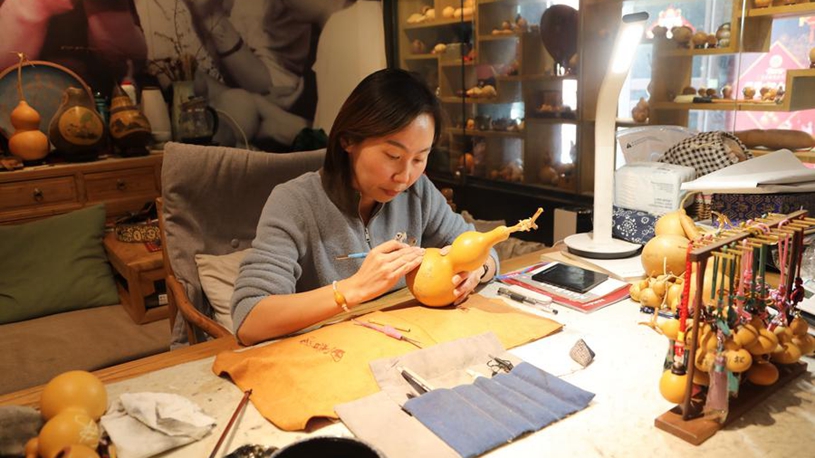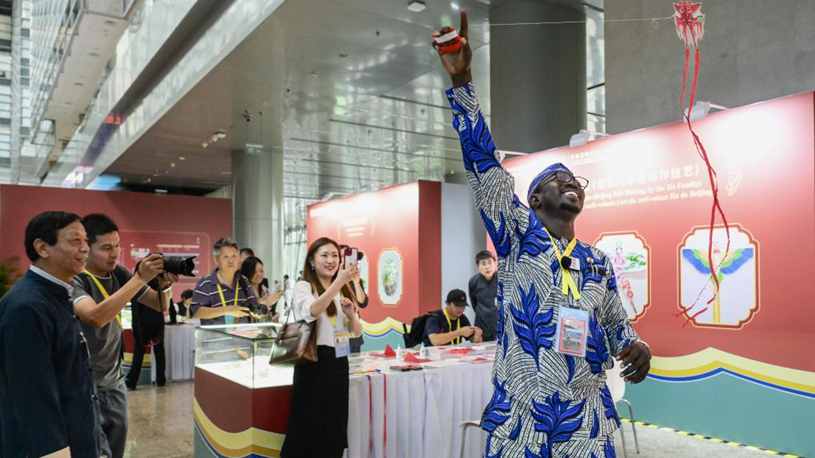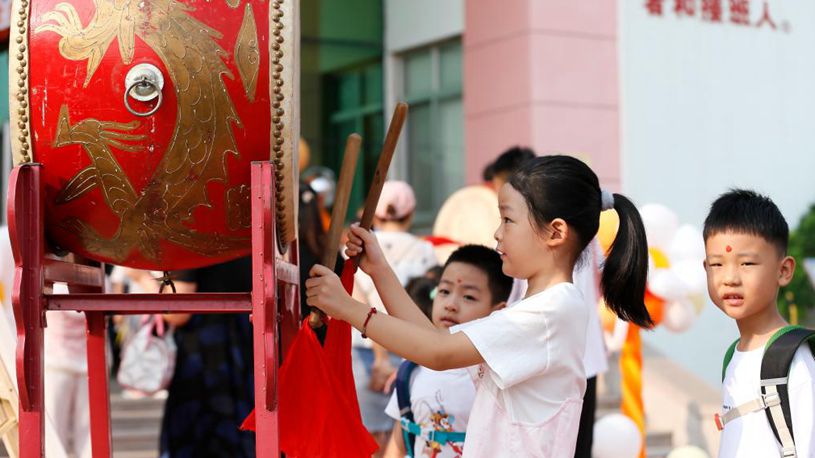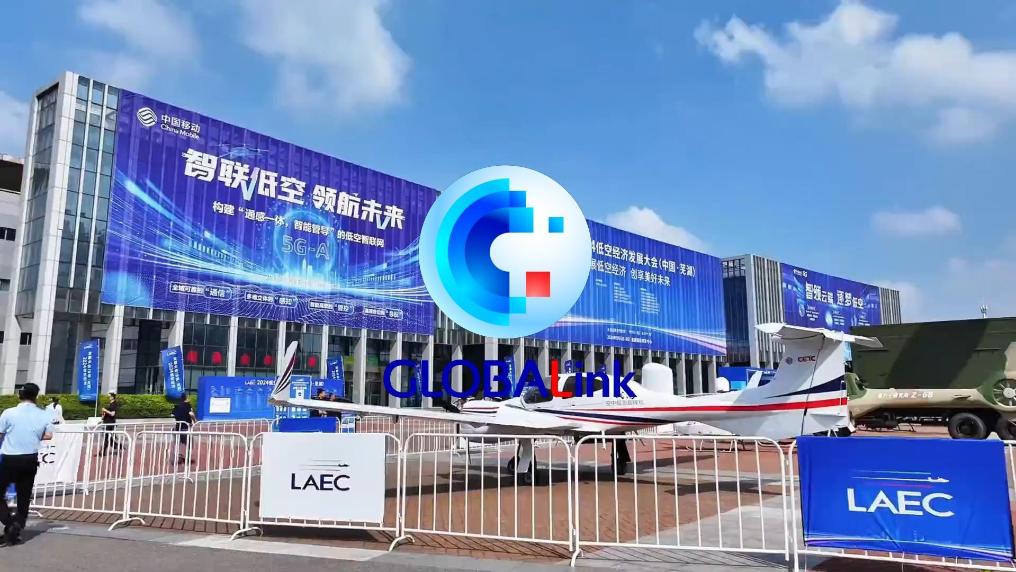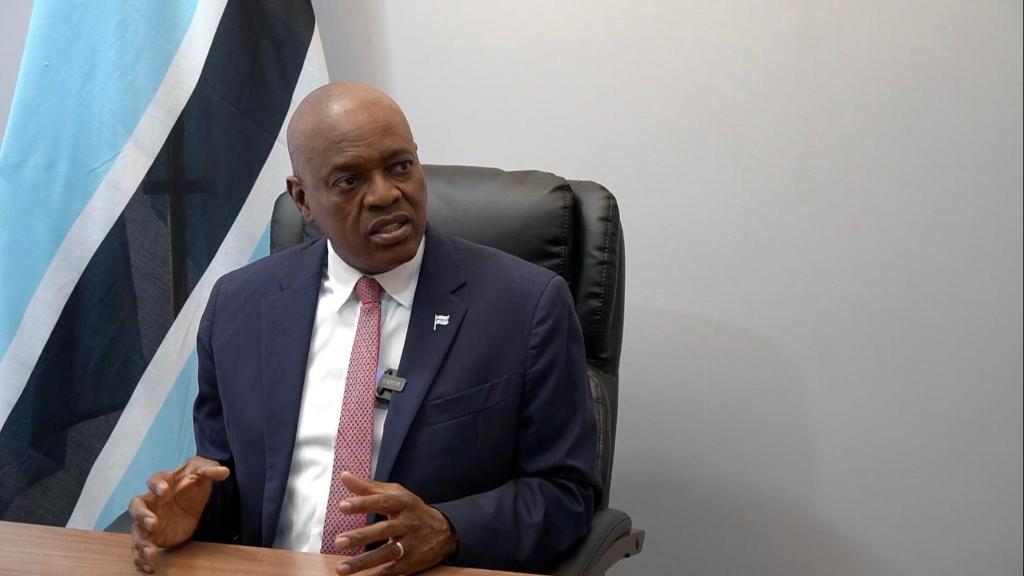* The year 2024 marks the China-ASEAN Year of People-to-People Exchanges.
* Many foreign students have benefited from educational cooperation between China and ASEAN countries, witnessing the deepening exchanges between the two sides.
* Data shows that the number of Chinese students studying in ASEAN countries and students of ASEAN countries studying in China surpassed 175,000 in 2023.
GUIYANG/NANNING, Sept. 7 (Xinhua) -- Nguyen Ngoc Son, a Gen-Z from Vietnam and an enthusiast of traditional Chinese medicine (TCM), saw studying in China as his best choice for further education.
Passionate about Chinese culture, Son chose TCM as his major in university and is now pursuing a master's degree in integrated Chinese and Western medicine at Gansu University of Chinese Medicine in northwest China's Gansu Province.
After graduation from his college in Vietnam in 2020, he spent three years working in the TCM department of a general hospital there, treating patients with herbs, acupuncture and massage techniques.
China and Vietnam are close neighbors and share similar cultures, and TCM techniques have become increasingly popular in Vietnam, Son said.
Like Son, many foreign students have benefited from educational cooperation between China and ASEAN countries, witnessing the deepening exchanges between the two sides.
The year 2024 marks the China-ASEAN Year of People-to-People Exchanges. Liu Baoli, former executive secretary general of the China-ASEAN Education Cooperation Week, said that China and ASEAN countries would continue to strengthen education cooperation and promote people-to-people exchanges to help build a closer China-ASEAN community with a shared future.
FLOURISHING PEOPLE-TO-PEOPLE EXCHANGES
Data shows that the number of Chinese students studying in ASEAN countries and students of ASEAN countries studying in China surpassed 175,000 in 2023.
"Studying in China is a good choice," said Soulideth Lavanphone from Laos, who completed his undergraduate and graduate studies in China.
Intrigued by China and its culture since childhood, Lavanphone began his studies at Tongren Polytechnic College in southwest China's Guizhou Province in 2012. He learned Chinese and majored in investment and finance, later earning a Chinese government scholarship to pursue an MBA at Sichuan University in 2018.
During his time in China, Lavanphone not only honed his professional knowledge but also witnessed the country's rapid economic development. He was inspired by the entrepreneurial spirit of the Chinese people through his participation in Chinese language competitions and public welfare activities.
After graduation, he returned to his hometown and became a bilingual tour guide, leveraging his excellent Chinese and professional skills. This role allowed him to connect with people from various industries and earn his "first bucket of gold."
In 2021, he was invited to serve as an overseas communicator for southwest China's Yunnan Province to promote cultural exchanges between China and Laos.
Noticing a growing interest among people from Laos in studying in China, he opened a Chinese language training center in his hometown this year to help them improve their Chinese proficiency and secure opportunities to study in China. During the summer vacation, the center attracted around 100 Laotian students.
"I gained invaluable knowledge and skills and enjoyed a vibrant life in China. Looking back, I know I made the right choice," Lavanphone said.
In addition to a focus on education, ASEAN students are also discovering broad job opportunities in China.
Tommy Tanu Wijaya from Indonesia began his studies at Guangxi Normal University in China's Guangxi Zhuang Autonomous Region in 2018 and received his doctoral degree from Beijing Normal University in July this year. He has decided to stay on and work as a post-doctoral fellow at Beijing Normal University.
"I'm grateful for the education I received in China and honored to contribute through my work here," Wijaya stated in a social media post.
Reflecting on his learning experiences in China, he noted his appreciation for the academic platform and the extensive opportunities available to international students.
During his doctoral studies, he participated in international cooperation projects with his supervisor and networked with foreign experts, which greatly benefited his research.
"After I came to China, I have met lots of friends and been to a lot of places. I cooperate with my Chinese friends and that broadens my vision," Wijaya said, adding that China and Indonesia have established solid cooperation across various sectors, including the economy and education.
EXPANDING TECHNICAL EDUCATION COOPERATION
At the 2024 China-ASEAN Education Cooperation Week held last month in Guiyang, the capital of Guizhou Province, Duangpaseuth Amphone from Laos was carrying out a live stream on TikTok, showcasing cameras produced in Guizhou, with orders displayed on a public screen beside him.
Since May this year, Zunyi Normal University, where Amphone is currently studying, has introduced a cross-border e-commerce course. The university has also partnered with Guizhou Qianyue Youpin Import and Export E-commerce Co., Ltd. to establish a cross-border e-commerce training base. This initiative provides practical opportunities for e-commerce livestreaming enthusiasts and helps promote local products in the international market.
So far, the training base has launched five international e-commerce routes to ASEAN countries, including Vietnam, Thailand and Laos, attracting many international students to participate.
Amphone, a junior majoring in financial management, used to sell local specialties and clothing from her hometown on Facebook, as well as products she purchased in China, back to Laos.
Amphone said that with the rapid growth of cross-border e-commerce and the valuable learning opportunities provided by her school, she plans to pursue the cross-border e-commerce as a career and strives to promote high-quality products from her hometown to the international market.
According to Li Mingze, general manager of Guizhou Qianyue Youpin Import and Export E-commerce Co., Ltd., the e-commerce training base mainly sells products from Guizhou, such as cameras and agricultural goods, with the sales volume via livestreamkng reaching 200,000 yuan (about 28,199 U.S. dollars) to date.
Chen Jin, an official with the Ministry of Education, said that so far, 111 colleges and universities across 24 provinces, municipalities and autonomous regions in China have launched such majors related to e-commerce.
In December 2023, the Cambodia-China University of Technology and Science was established in Phnom Penh to train e-commerce professionals.
Sok Huy, the university's executive principal, announced that the first group of 70 Cambodian undergraduates has been enrolled to study both the Chinese language and e-commerce. The university also plans to train 1,000 e-commerce professionals in short video production and customer service.
As China and ASEAN countries enhance connectivity, major construction projects like the Jakarta-Bandung High-Speed Railway, the China-Laos Railway, and the China-Thailand Railway are generating a high demand for railway-related talent.
In December 2021, the China-Laos Railway was officially opened. In September 2022, Vue Xiong and 13 other students from Laos came to study traffic operation and management at Liuzhou Railway Vocational Technical College in Guangxi.
Recalling his first experience on a high-speed train, Xiong said he felt both nervous and excited. "The train was incredibly fast, which made me a bit anxious at first, but it soon ran smoothly."
Optimistic about the future of high-speed trains, he chose to study in China with the hope of returning home to contribute to his country's transportation industry.
Shi Zhongjun, secretary-general of the ASEAN-China Center, said education is an important component of people-to-people exchanges between China and ASEAN, and talent is a crucial support for the development of China and ASEAN countries.
In recent years, education cooperation between the two sides at all levels has been enhanced, and personnel training and scientific and technological cooperation have achieved fruitful results, Shi added.
(Video reporters: Cui Xiaoqiang, Xu Siyuan, Guo Yifan; Video editors: Li Ziwei, Zak Zuzanna, Li Qin) ■


